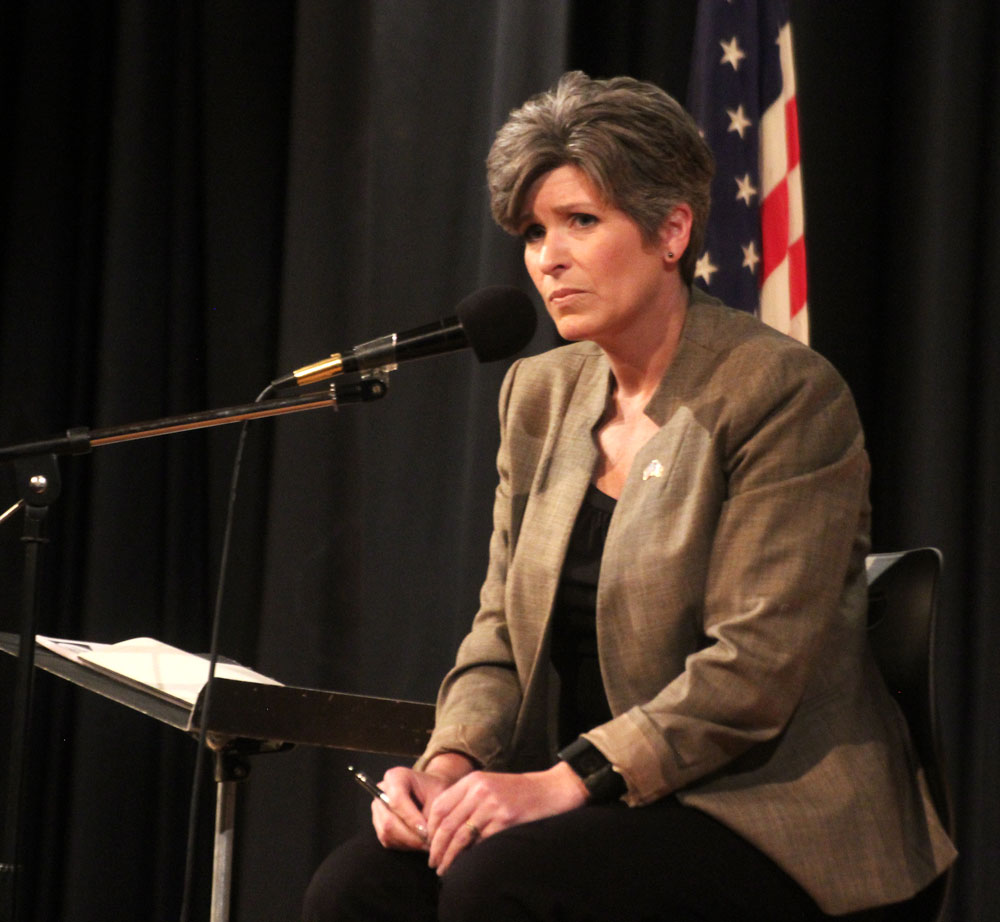Sen. Ernst ‘leaning yes’ on Graham-Cassidy bill
By Kate Hayden, khayden@charlescitypress.com
U.S. Sen. Joni Ernst is “leaning toward” voting yes on the Graham-Cassidy health care bill, she told Iowans in Charles City on Thursday.
Her statement was met with both applause and vocal criticism by the small group gathered in the North Grand Auditorium.
Questions during the hour-long town hall hosted by Ernst were overwhelmingly directed toward the future of health care and insurance accessibility in Iowa.
The Graham-Cassidy proposal needs to be a priority for Congress to resolve before the end of this session, Ernst told the Press following the town hall.
She criticized Sen. Mitch McConnell for scheduling a break in October, and said the Senate has too much to accomplish to earn a break away from Washington, D.C.
“The health care debate needs to be taken care of first,” said Iowa’s junior Republican Senator. “Folks in other states may disagree, but in Iowa, we just heard from a woman who got her cancellation notice in the mail. This is very pressing. We have to address this right away.”
“Then we do need to address (Deferred Action for Childhood Arrivals),” she added. “Then we do have the debt ceiling as well. They’re all pressing, and I will tell you, we actually can do multiple things as legislators at one time.”
Audience members recounted personal stories of illness, loss of insurance or chronic reliance on expensive procedures, before some asked Ernst to support and some urged her to oppose the Graham-Cassidy proposal.
“It is a plan that was proposed several months ago as we move through repeal and replacement of Obamacare. What we know is that it could be a long-term solution,” Ernst told the crowd. “Most folks would agree that the (Affordable Care Act) does need tweaking.”
The Graham-Cassidy proposal is designed to turn control of health care markets over from the federal government to state governments. Federal government would no longer fund Medicaid or subsidies directly. Instead, states would receive a block grant to develop any system the state government supports. The proposal also allows states to apply for waivers out of many ACA regulations.
“I don’t feel like (pre-existing condition coverage) would go away. Each state would have to engage in that discussion,” Ernst told reporters. “They would have to do some serious explaining to the Health and Human Services secretary if they were trying to get rid of that.”
Ernst supported the proposal while sharply criticizing Democratic senators, who she said went through the motions of bipartisanship while sticking to their plans.
“We heard from insurance commissioners from all over the United States, we heard from governors, Democrats and Republicans,” Ernst said. “The Democrats rejected every offer that came up on the table. The bottom line is they said, ‘We just want the money right now. We don’t want to change everything.’
“And it all imploded last week.”
Audience members, some speaking through tears, asked Ernst about small-town clinic closures, including Planned Parenthood; about assuring Iowans with managed health care plans continue receiving treatment; and how a cut in Medicaid spending would affect clinics’ ability to pay for treatment in rural Iowa.
Ernst said the ACA only affected health insurance coverage for Americans without affecting the prices of medications or services, and said the government should place more emphasis on balancing service costs. She also said cuts to Medicaid funding would prioritize serving elderly and disabled.
“Medicaid is a cut from what the ACA may have projected, but it is still an increase in dollars (to people’s services),” she said.
“Iowa’s in a difficult situation right now, and unfortunately in the short term it looks like we’re going to face those extreme costs in insurance,” Ernst said. “Even if we got (Graham-Cassidy) passed, it wouldn’t start until 2020. We need a path forward for Iowans losing insurance now.”
Ernst also fielded multiple questions surrounding so-called Dreamers and Deferred Action for Childhood Arrivals (DACA). President Donald Trump recently announced he’ll halt DACA after six months if Congress doesn’t reach a permanent solution for childhood immigrants who have not received legal status.
Ernst said she agreed with President Trump’s ending of the Obama-era executive order, and that the move forces Congress to offer a permanent solution to DACA recipients.
“We have a place here for our Dreamers,” Ernst told the crowd, adding that she supported providing some sort of permanent status for DACA recipients — allowing them to work, study or serve in the military without granting full citizenship.
But Ernst also said action on DACA “is a one-time fix,” and she supports securing U.S. borders to prevent a cycle of childhood immigrants without permanent status in the country.
“We need a better way to do immigration, and we can start with Dreamers,” Ernst said.











Social Share